Papers by TIJANI IDDRISU INUSAH

Women's access to critical resources such as land is one of the most topical issues amongst devel... more Women's access to critical resources such as land is one of the most topical issues amongst development practitioners, gender advocates, and policymakers alike. Land is one of the bases of wealth, power and authority in most developing countries. As such, no meaningful development takes place without land resources, yet gender inequalities with respect to land allocation and distribution exist in most Sub-Saharan African countries, especially northern Ghana where majority of the affected are women. This paper examined the effect of the customary land tenure system on landless women smallholder farmers and Agro-processors in West Mamprusi Municipality. Primary data from individuals and household heads, chiefs, and Tingban-dima (landowners), were gathered using semi-structured interviews, focus group discussions, and in-depth interviews. Secondary was also extensively reviewed as a complement to the primary data in the area of study. The study revealed significant gender disparities between men and women relative to land allocation and land access. Women access to land was abysmal compared to that of men. The situation was also found to be aggravated by the dominant patriarchal relations which favour men relative to property ownership. only a hand-full of women had owned and access to some lands but in most cases, such lands were reported to be poorer in quality, and lack proximity relative to complementary resources such as water. additionally, some lands in the hands of women came in with hefty royalties, thereby exacerbating their plight. The productive capacity of women in food production, agro-processing, vegetable production, and animal husbandry was found to be impeded by the land tenure system which limits their livelihood opportunities thereby widening the poverty-gap amongst women and men. Nonetheless, women's access to land has seen a bit of improvement over the years, considering the recognition of women's contribution to household income and the nutritive diet of children, but indigenous traditional inheritance structures still limit the potentials of women in this direction. The need to therefore advocate for a change in traditional land ownership and distribution by emphasizing on the women's right and contribution to development. The constitution of Ghana allows for equal access to land irrespective of gender; this must therefore be advocated. This will address the gender gap in land and water resources to pave the way for women in agriculture, which will improve rural livelihoods, especially women in reproductive age.
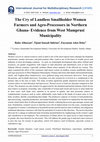
Baba Alhassan, 2024
Women's access to critical resources such as land is one of the most topical issues amongst devel... more Women's access to critical resources such as land is one of the most topical issues amongst development practitioners, gender advocates, and policymakers alike. Land is one of the bases of wealth, power and authority in most developing countries. As such, no meaningful development takes place without land resources, yet gender inequalities with respect to land allocation and distribution exist in most Sub-Saharan African countries, especially northern Ghana where majority of the affected are women. This paper examined the effect of the customary land tenure system on landless women smallholder farmers and Agro-processors in West Mamprusi Municipality. Primary data from individuals and household heads, chiefs, and Tingban-dima (landowners), were gathered using semi-structured interviews, focus group discussions, and in-depth interviews. Secondary was also extensively reviewed as a complement to the primary data in the area of study. The study revealed significant gender disparities between men and women relative to land allocation and land access. Women access to land was abysmal compared to that of men. The situation was also found to be aggravated by the dominant patriarchal relations which favour men relative to property ownership. only a hand-full of women had owned and access to some lands but in most cases, such lands were reported to be poorer in quality, and lack proximity relative to complementary resources such as water. additionally, some lands in the hands of women came in with hefty royalties, thereby exacerbating their plight. The productive capacity of women in food production, agro-processing, vegetable production, and animal husbandry was found to be impeded by the land tenure system which limits their livelihood opportunities thereby widening the poverty-gap amongst women and men. Nonetheless, women's access to land has seen a bit of improvement over the years, considering the recognition of women's contribution to household income and the nutritive diet of children, but indigenous traditional inheritance structures still limit the potentials of women in this direction. The need to therefore advocate for a change in traditional land ownership and distribution by emphasizing on the women's right and contribution to development. The constitution of Ghana allows for equal access to land irrespective of gender; this must therefore be advocated. This will address the gender gap in land and water resources to pave the way for women in agriculture, which will improve rural livelihoods, especially women in reproductive age.

Studies have been done in many different fields on how to manage stakeholders, which shows how im... more Studies have been done in many different fields on how to manage stakeholders, which shows how important it is to put the stakeholder at the center of any program or project. The study looks at the Social Impact Assessment (SIA) of the Tamale viaduct project. The sample size was established using the results of a census. Data was gathered using a key informant interview guide and structured questionnaires using a snowball sampling technique. Out of 128 affected respondents, 120 questionnaires responded to the tools, and three key informant interviews were conducted with significant stakeholders. The analyses show that many communication channels were employed to get in touch with the project's affected stakeholders. Although they were frequently involved, the stakeholders were not allowed to contribute to the decisionmaking process. The respondents viewed prioritizing the stakeholders, creating a plan for stakeholder involvement, and planning communication as the most effective stakeholder management techniques. Communication problems were cited as a major obstacle to interacting with the stakeholders.

Studies have been done in many different fields on how to manage stakeholders, which shows how im... more Studies have been done in many different fields on how to manage stakeholders, which shows how important it is to put the stakeholder at the center of any program or project. The study looks at the Social Impact Assessment (SIA) of the Tamale viaduct project. The sample size was established using the results of a census. Data was gathered using a key informant interview guide and structured questionnaires using a snowball sampling technique. Out of 128 affected respondents, 120 questionnaires responded to the tools, and three key informant interviews were conducted with significant stakeholders. The analyses show that many communication channels were employed to get in touch with the project's affected stakeholders. Although they were frequently involved, the stakeholders were not allowed to contribute to the decision-making process. The respondents viewed prioritizing the stakeholders, creating a plan for stakeholder involvement, and planning communication as the most effective stakeholder management techniques. Communication problems were cited as a major obstacle to interacting with the stakeholders.

PEOPLE: International Journal of Social Sciences, 2020
Irregular rainfall pattern pose challenges to smallholder farmers in Ghana, especially, those in ... more Irregular rainfall pattern pose challenges to smallholder farmers in Ghana, especially, those in the Northern Region, who risk losing their major source of livelihood as a result of the devastating impacts of climate change. To ensure food and livelihood security, smallholder farmers adopt indigenous and modern soil and water conservation strategies. This study therefore examined the influencing factors of adaptation to irregular rainfall pattern and the challenges therein. A cross sectional data of 140 households from five (5) randomly selected districts in the Northern region of Ghana was used. Results of a Negative Binomial Regression showed that access to extension services and credit positively influenced the number of adaptation strategies to irregular rainfall pattern. Also, quantity harvested, gender and age negatively influenced the number of adaptation strategies adopted by a farmer.

Journal of Geoscience and Environment Protection
The management of municipal solid waste (MSW) has become a matter of great concern. As a result o... more The management of municipal solid waste (MSW) has become a matter of great concern. As a result of this, there have been strenuous efforts at all levels geared towards addressing this menace. Although there are several methods of disposing of waste, landfills remain one of the outstanding management systems in dealing with the growing quantum of generated municipal solid waste. This study assessed the consequence of poor landfill management from the perspective of the Gbalahi landfill in the Sagnarigu Municipality in Northern Ghana. The study employed interviews to gather information from 103 households. The acquired data was supported by some secondary data from the site management and the municipal environmental unit. The study revealed that poor management of the facility has led to the breakdown of some major components of the facility. It was also noted that the site poses a threat to the health of the nearby communities owing to the uncontrolled dust, smoke, and activities of vermin as well as scavengers. The study concludes the Ghalahi landfill in its current state remains a threat to the health of the inhabitants of the area. Poor management of equipment and failure to adhere to best practices has exacerbated conditions of their operation putting the health of the people in danger. Regular monitoring of the site by the EPA and the local government authorities can help reduce the risk of exposure on the nearby communities.

PEOPLE: International Journal of Social Sciences
Irregular rainfall pattern pose challenges to smallholder farmers in Ghana, especially, those in ... more Irregular rainfall pattern pose challenges to smallholder farmers in Ghana, especially, those in the Northern Region, who risk losing their major source of livelihood as a result of the devastating impacts of climate change. To ensure food and livelihood security, smallholder farmers adopt indigenous and modern soil and water conservation strategies. This study therefore examined the influencing factors of adaptation to irregular rainfall pattern and the challenges therein. A cross sectional data of 140 households from five (5) randomly selected districts in the Northern region of Ghana was used. Results of a Negative Binomial Regression showed that access to extension services and credit positively influenced the number of adaptation strategies to irregular rainfall pattern. Also, quantity harvested, gender and age negatively influenced the number of adaptation strategies adopted by a farmer. Consistently, lack of credit was the first major constraint to climate adaptation among the farmers. The PEOPLE: International Journal of Social Sciences ISSN 2454-5899 987 study recommends that extension services, credit facilities as well as education of smallholder farmers should be intensified to promote adaptation to the rainfall patterns in the region. Also, government's effort is needed in developing irrigation facilities to aid smallholder farmers to offset the potential effects of climate change. Overall, this study provides suggestions to policy makers on how to improve climate adaptation in the region. Future studies should examine forms and effectiveness of climate change communication, since effective communication is imperative to the adoption of modern agricultural practices.
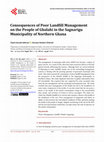
Journal of Geoscience and Environment Protection, 2021
The management of municipal solid waste (MSW) has become a matter of great concern. As a result o... more The management of municipal solid waste (MSW) has become a matter of great concern. As a result of this, there have been strenuous efforts at all levels geared towards addressing this menace. Although there are several methods of disposing of waste, landfills remain one of the outstanding management systems in dealing with the growing quantum of generated municipal solid waste. This study assessed the consequence of poor landfill management from the perspective of the Gbalahi landfill in the Sagnarigu Municipality in Northern Ghana. The study employed interviews to gather information from 103 households. The acquired data was supported by some secondary data from the site management and the municipal environmental unit. The study revealed that poor management of the facility has led to the breakdown of some major components of the facility. It was also noted that the site poses a threat to the health of the nearby communities owing to the uncontrolled dust, smoke, and activities of vermin as well as scavengers. The study concludes the Ghalahi landfill in its current state remains a threat to the health of the inhabitants of the area. Poor management of equipment and failure to adhere to best practices has exacerbated conditions of their operation putting the health of the people in danger. Regular monitoring of the site by the EPA and the local government authorities can help reduce the risk of exposure on the nearby communities.
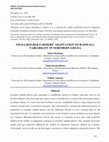
PEOPLE: International Journal of Social Sciences, 2020
Irregular rainfall pattern pose challenges to smallholder farmers in Ghana, especially, those in ... more Irregular rainfall pattern pose challenges to smallholder farmers in Ghana, especially, those in the Northern Region, who risk losing their major source of livelihood as a result of the devastating impacts of climate change. To ensure food and livelihood security, smallholder farmers adopt indigenous and modern soil and water conservation strategies. This study therefore examined the influencing factors of adaptation to irregular rainfall pattern and the challenges therein. A cross sectional data of 140 households from five (5) randomly selected districts in the Northern region of Ghana was used. Results of a Negative Binomial Regression showed that access to extension services and credit positively influenced the number of adaptation strategies to irregular rainfall pattern. Also, quantity harvested, gender and age negatively influenced the number of adaptation strategies adopted by a farmer.
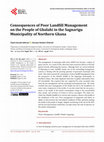
The management of municipal solid waste (MSW) has become a matter of great concern. As a result o... more The management of municipal solid waste (MSW) has become a matter of great concern. As a result of this, there have been strenuous efforts at all levels geared towards addressing this menace. Although there are several methods of disposing of waste, landfills remain one of the outstanding management systems in dealing with the growing quantum of generated municipal solid waste. This study assessed the consequence of poor landfill management from the perspective of the Gbalahi landfill in the Sagnarigu Municipality in Northern Ghana. The study employed interviews to gather information from 103 households. The acquired data was supported by some secondary data from the site management and the municipal environmental unit. The study revealed that poor management of the facility has led to the breakdown of some major components of the facility. It was also noted that the site poses a threat to the health of the nearby communities owing to the uncontrolled dust, smoke, and activities of vermin as well as scavengers. The study concludes the Ghalahi landfill in its current state remains a threat to the health of the inhabitants of the area. Poor management of equipment and failure to adhere to best practices has exacerbated conditions of their operation putting the health of the people in danger. Regular monitoring of the site by the EPA and the local government authorities can help reduce the risk of exposure on the nearby communities.

in the Northern Region, who risk losing their major source of livelihood as a result of the devas... more in the Northern Region, who risk losing their major source of livelihood as a result of the devastating impacts of climate change. To ensure food and livelihood security, smallholder farmers adopt indigenous and modern soil and water conservation strategies. This study therefore examined the influencing factors of adaptation to irregular rainfall pattern and the challenges therein. A cross sectional data of 140 households from five (5) randomly selected districts in the Northern region of Ghana was used. Results of a Negative Binomial Regression showed that access to extension services and credit positively influenced the number of adaptation strategies to irregular rainfall pattern. Also, quantity harvested, gender and age negatively influenced the number of adaptation strategies adopted by a farmer. Consistently, lack of credit was the first major constraint to climate adaptation among the farmers. The PEOPLE: International Journal of Social Sciences ISSN 2454-5899 987 study recommends that extension services, credit facilities as well as education of smallholder farmers should be intensified to promote adaptation to the rainfall patterns in the region. Also, government's effort is needed in developing irrigation facilities to aid smallholder farmers to offset the potential effects of climate change. Overall, this study provides suggestions to policy makers on how to improve climate adaptation in the region. Future studies should examine forms and effectiveness of climate change communication, since effective communication is imperative to the adoption of modern agricultural practices.
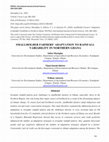
PEOPLE: International Journal of Social Sciences, 2020
Irregular rainfall pattern pose challenges to smallholder farmers in Ghana, especially, those in ... more Irregular rainfall pattern pose challenges to smallholder farmers in Ghana, especially, those in the Northern Region, who risk losing their major source of livelihood as a result of the devastating impacts of climate change. To ensure food and livelihood security, smallholder farmers adopt indigenous and modern soil and water conservation strategies. This study therefore examined the influencing factors of adaptation to irregular rainfall pattern and the challenges therein. A cross sectional data of 140 households from five (5) randomly selected districts in the Northern region of Ghana was used. Results of a Negative Binomial Regression showed that access to extension services and credit positively influenced the number of adaptation strategies to irregular rainfall pattern. Also, quantity harvested, gender and age negatively influenced the number of adaptation strategies adopted by a farmer. Consistently, lack of credit was the first major constraint to climate adaptation among the farmers. The PEOPLE: International Journal of Social Sciences ISSN 2454-5899 987 study recommends that extension services, credit facilities as well as education of smallholder farmers should be intensified to promote adaptation to the rainfall patterns in the region. Also, government's effort is needed in developing irrigation facilities to aid smallholder farmers to offset the potential effects of climate change. Overall, this study provides suggestions to policy makers on how to improve climate adaptation in the region. Future studies should examine forms and effectiveness of climate change communication, since effective communication is imperative to the adoption of modern agricultural practices.
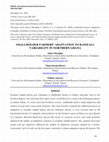
PEOPLE: International Journal of Social Sciences, 2020
Irregular rainfall pattern pose challenges to smallholder farmers in Ghana, especially, those in ... more Irregular rainfall pattern pose challenges to smallholder farmers in Ghana, especially, those in the Northern Region, who risk losing their major source of livelihood as a result of the devastating impacts of climate change. To ensure food and livelihood security, smallholder farmers adopt indigenous and modern soil and water conservation strategies. This study therefore examined the influencing factors of adaptation to irregular rainfall pattern and the challenges therein. A cross sectional data of 140 households from five (5) randomly selected districts in the Northern region of Ghana was used. Results of a Negative Binomial Regression showed that access to extension services and credit positively influenced the number of adaptation strategies to irregular rainfall pattern. Also, quantity harvested, gender and age negatively influenced the number of adaptation strategies adopted by a farmer. Consistently, lack of credit was the first major constraint to climate adaptation among the farmers. The PEOPLE: International Journal of Social Sciences ISSN 2454-5899 987 study recommends that extension services, credit facilities as well as education of smallholder farmers should be intensified to promote adaptation to the rainfall patterns in the region. Also, government's effort is needed in developing irrigation facilities to aid smallholder farmers to offset the potential effects of climate change. Overall, this study provides suggestions to policy makers on how to improve climate adaptation in the region. Future studies should examine forms and effectiveness of climate change communication, since effective communication is imperative to the adoption of modern agricultural practices.

Uploads
Papers by TIJANI IDDRISU INUSAH